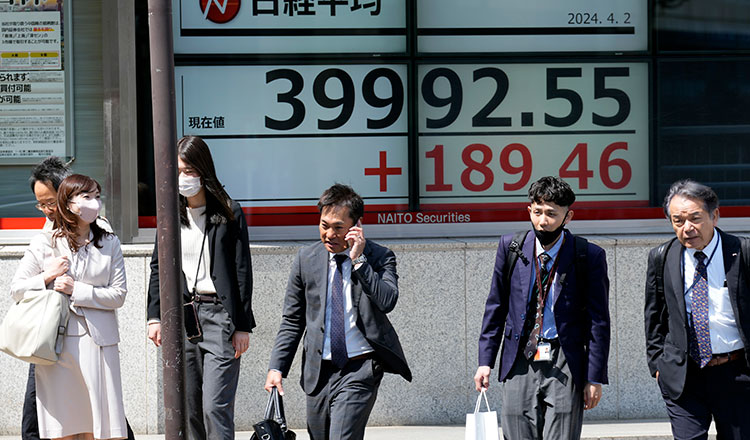Hong Kong stocks led gains in Asian markets Tuesday, though China real estate developer Vanke slumped more than 10 percent, while investors evaluated economic data from South Korea and Australia.
US futures were lower while oil prices rose.
Tokyo’s Nikkei 225 index climbed 0.3 percent to 39,936.35, recovering from Monday’s decline.
The Hang Seng in Hong Kong added 2.7 percent to 16,981.43, and the Shanghai Composite index was up 0.1 percent at 3,080.51.
Vanke’s Hong Kong-listed shares slumped 11.4 percent in early trading Tuesday after the company’s report last week of a notable 50.6 percent decrease in 2023 core profit and no dividend payout.
China had made a rare intervention in March to ask banks to provide financing support for Vanke.
In South Korea, the Kospi edged 0.1 percent higher to 2,750.63 after data showed the country’s consumer prices rose 3.1 percent in March compared to the same period last year, matching the previous month’s pace.
Australia’s S&P/ASX 200 gained less than 0.1 percent to 7,900.50, despite its manufacturing sector index contracting to 47.3 in March from 47.8 in February, its fastest pace since May 2020.
On Wall Street, the S&P 500 dipped 0.2 percent from its all-time high to finish at 5,243.77 on Monday. The Dow Jones Industrial Average dropped 0.6 percent from its record to 39,566.85. The Nasdaq composite was an outlier and added 0.1 percent to 16,396.83.
FedEx fell 3.3 percent after it said it did not extend its contract with the US Postal Service to deliver air cargo domestically, which will end Sept. 29. Donald Trump’s social media company, Trump Media & Technology Group, lost more than a fifth of its value in another frenetic day of trading.
Universal Health Services sank 4 percent for one of the S&P 500’s larger losses. It said a jury in Illinois awarded $535 million in damages to a patient who alleged negligence in a sexual-assault case involving another patient.
Helping to keep the losses in check was Newmont. The miner’s stock rose 1.6 percent as the price of gold continues to set records.
In the bond market, Treasury yields spurted higher after a report said US manufacturing unexpectedly returned to growth last month. It snapped a 16-month run of contraction, according to the Institute for Supply Management.
It’s the latest evidence showing the US economy remains strong despite high-interest rates. That’s a positive for the stock market because it can drive growth in profits for companies. But it can also keep upward pressure on inflation. That in turn could mean a more hesitant Federal Reserve when it comes to the cuts to interest rates that investors crave.
Following the manufacturing data, traders on Wall Street briefly trimmed bets on the first cut to rates coming as soon as June. That’s still a “reasonable baseline” expectation, according to Deutsche Bank economists, but they say tough talk from Fed officials recently could hint at interest rates staying higher for longer than earlier thought.
The Fed has hiked its main rate to the highest level since 2001 in order to slow the economy and depress investment prices enough to get inflation under control. Expectations for coming cuts have been a major reason the S&P 500 soared more than 20 percent from October through March.
This week will offer several economic reports that could sway the Fed’s thinking, including updates on job openings across the country and the strength of US services businesses. The headliner arrives on Friday, when economists expect a report to show that hiring cooled a bit last month.
A slowdown would be welcome on Wall Street, where the hope is that the economy remains solid but not so strong that it pushes inflation higher. Inflation is milder than it was at its peak nearly two years ago. But progress has become bumpier recently, with reports this year coming in hotter than expected.
In other trading, US benchmark crude oil rose 40 cents to $84.11 per barrel in electronic trading on the New York Mercantile Exchange. Brent crude, the international standard, added 34 cents to $87.76 per barrel.
The US dollar rose to 151.66 Japanese yen from 151.63 yen. The euro cost $1.0735, down from $1.0743.














